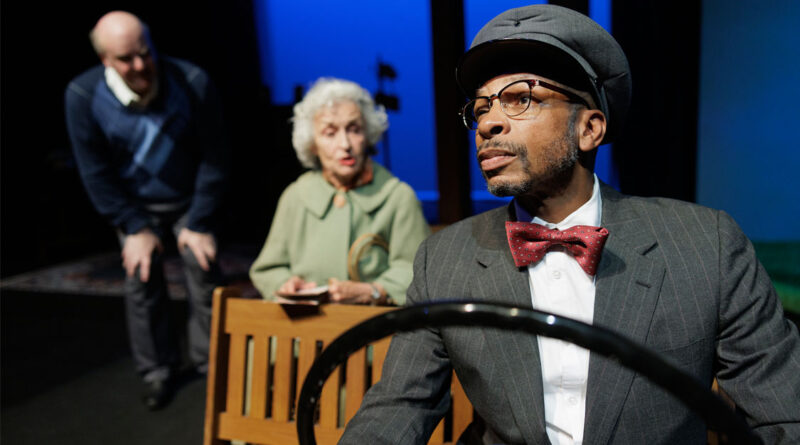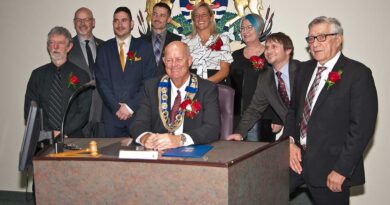The New Driving Miss Daisy
By John Swartz
Here’s the thing about putting on a play like Driving Miss Daisy, which became a movie with 9 Academy Award nominations – best picture, screen play and for each of, Jesscia Tandy, Morgan Freeman and Dan Ackroyd in 1989, even if you didn’t see the movie you couldn’t escape the media hype, and those three actors are burned into memories of millions for their portrayals of the three central characters. Heck my neighbour’s dog knows these actors for those roles. How is an actor today supposed to overcome the audience watching their work and thinking about the movie actors?
I don’t know, but Linda Goranson, Cassel Miles and Stuart Dowling did it. I don’t remember much about Tandy’s performance, other than I can form an image of her from the movie. Ackroyd lives a little better mainly because no one expected him to be in a movie like this and he turned in a memorable performance that didn’t rely on being a buffoon.
![]()


Freeman however, that’s something a little different. Like his work in Shawshank Redemption, I’ll bet right now you can recall a scene from Driving Miss Daisy of his, or two, like it’s happening before your eyes in living Technicolor.
This is where being an actor comes into play, or the play. Miles really can’t go anywhere near how Freeman did it, not the mannerism, not the voice, not anything. Miles has to reinvent Hoke Coleburn in his own image if this production is going to succeed, which he did.
Gornason and Dowling need to do the same thing, but it seems to me Miles had the biggest burden in this regard. I didn’t give the forerunners a second thought until starting to write this review.
Jesse Collins took a big risk choosing to do this play considering the history of it. The audience has to forget they ever saw it before if they are going to like it enough to tell their friends to go see it. That makes the casting even more important. Collins picked correctly. Next is getting the story portrayed in a way that seems new.
Quick, what’s the story? You probably can’t say what it is. There really isn’t one. There is no goal to achieve, no struggle to overcome, nothing. It’s just vignettes of the life of one spinster, her unwanted driver and how their relationship changes over 25 years.
Daisy doesn’t want the driver her son, Boolie, hired. Not because he’s black, she doesn’t want a Martian to drive her either. She’s angry because her freedom is curtailed when Boolie takes the keys to her car away following an accident.
There is institutional racism that would be common in 1948 Atlanta which is not an overt device in the play, but it’s there. In fact it seems to me Daisy and Boolie are rather progressive in their attitude toward, at least Blacks, if not other races. There’s just some things that get baked in growing up and living in Georgia during those times, like distrust of each other.
Familiarity tends to wipe out distrust over time, as it does in this story. Daisy eventually comes to rely on Hoke in many ways, particularly for friendship since there are no other characters to form friendships with and none are referenced. That might be because she and Boolie are Jewish and this isn’t New York. If the story was fleshed out more, I suspect neither would have a car full of friends to boast.
One thing about Miles’s performance which stood out was how Miles aged his character (Hoke is 60 at the beginning and 85 at the end) with a device as simple as how he stands.
![]()



![]()
Collins also used an interesting set designed. Half the stage serves as at least 7 sets by my count. He achieved this with a turntable on which revolved three ‘rooms’. In fact, while one is exposed, the other two can be dressed by the backstage crew ready for the next appearances.
In general, congratulations to everyone involved in this production for giving us reason to forget what we know so quickly in the opening scenes and giving us something fresh to enjoy. You can do so until August 12 and tickets are available online.
The runtime is 77 minutes and there is no intermission. Do what you think is best with that information.
(Photo by Cole Bennett – Portage Creative) Main: Stuart Dowling, Linda Goranson and Cassel Miles in the Opera House production of Driving Miss Daisy.




